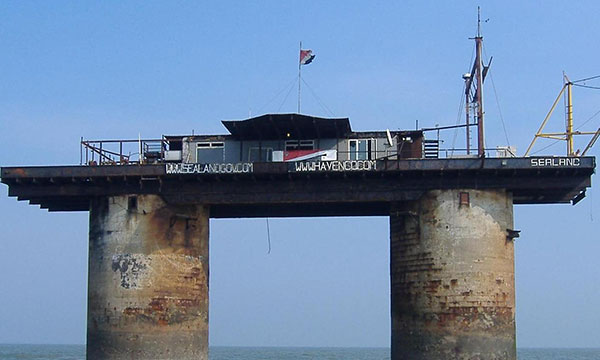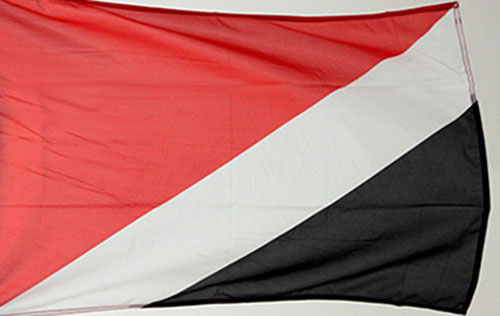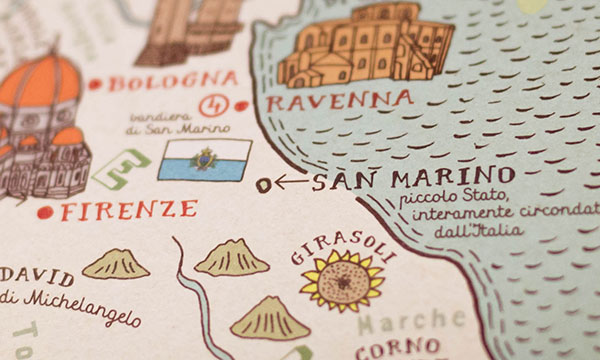This Land Is My Land
Not everyone recognizes many micronations, but that hasn't stopped people from creating them and keeping them going. Just ask the fine folks of Sealand.

Pirate radio's (arguably) sovereign legacy
In 2009, the late Philip Seymour Hoffman starred in perhaps his most underrated film—a film, originally called The Boat That Rocked, that highlighted the culture of pirate radio that hit the United Kingdom in the mid-1960s. (It appeared in the U.S., in a heavily edited form, under the name Pirate Radio.)
Here's a true story that didn't get in the film: During World War II, the British government created an offshore anti-aircraft facility called HM Fort Roughs. After the war, however, the concrete-and-metal installation went empty, falling into disuse.
That made it a prime location for pirate radio stations to start running their operations—especially as it was based in international waters. Many ran their stations on offshore ships to avoid prosecution, but HM Fort Roughs eventually became a heavily contested plot of land, especially after the British government passed the Marine Broadcasting Offenses Act in 1967.
That year, the fort was forcibly overtaken by affiliates of Major Paddy Roy Bates, the owner of the pirate radio station Essex Radio. He planned to launch a new hub for his radio station. Instead, he built a country.
That country, Sealand, has been active ever since.

Sealand: A flag of its own
Sealand has never been officially recognized by most countries, but that hasn't stopped the micronation from formalizing its efforts. In the 1970s, Sealand gained a flag, its own form of currency, and a laissez-faire reputation.
Today, the manmade island has an active website that sells titles and ID cards to the internet masses. (Wanna be a lord or lady? Just spend a few pounds.) The country also has its own amateur soccer team that frequently tours various parts of the world. And in recent years, Sealand has come up as a potential home for Wikileaks.
But the fort has nonetheless seen its share of tough times. In the late 1970s, an attempted coup dulled the fort's anything-goes vibe. And companies formed on Sealand don't exactly have a great track record. As Ars Technica notes, a company already tried (and failed) to run a web-hosting service on Sealand.
Nonetheless, the endeavor left its founder, Major Paddy Roy Bates, with a monarchy of his own—a rusted floating clap-trap where he was a prince—and, before his 2012 death, a life story better than most movies.
"I might die young or I might die old, but I will never die of boredom," Bates was once quoted as saying. In the end, Alzheimer's did him in—not boredom.
"The escape into the virtual by the CY citizens may be understood as a simultaneous movement away from this type of destructive politics that would ultimately lead to the complete de-legitimation of the earthly tyranny and a call for a new project of global identity based on what Yugoslavia used to be."
— University of Wisconsin professor Tomislav Longinovic, discussing the diplomatic concerns that led to the creation of "Cyber Yugoslavia," a 1999 effort to build on online cybernation after the the Yugoslav Wars tore apart the Eastern European country in 1991. The website had the eventual goal of getting 5 million people from around the world to sign up, enough to convince the United Nations to give the website its own nation-state. The site remains online today, though it hasn't been updated in more than a decade.
Five reasons to start a micronation
- An unpaid debt. The United Kingdom's Shetland Islands were originally handed over to the Scottish government in 1469 as an effort to raise money for a dowry for the daughter of the King of Denmark. But local resident Stuart Hill says the loan was never officially repaid, meaning that the colony shouldn't be British. He founded the micronation Forvick in 2008.
- A social experiment. After a military base in Copenhagen was abandoned, in the early 1970s, an alternative newspaper editor named Jacob Ludvigsen suggested that the base be converted into a mass commune, as an opportunity to start over with lawless ideals. Four decades later, Christiania is still going strong.
- A satirical protest. When the U.S. Border Patrol put up a traffic-snarling checkpoint in Key West in the early 1980s, the city's mayor and a number of local residents responded by creating the Conch Republic. It was a joke, but there was a serious goal behind it: to stop the traffic jam. The protest worked—soon the border checkpoint disappeared.
- A not-so-satirical protest. In 2004, the Gay and Lesbian Kingdom got underway in protest of the Australian government's ban on gay marriage. "We live under a regime of apartheid," the group's website states. "It is an apartheid not based on the colour of our skin, but on the colour of our sexuality."
- Impressing your daughter. Last year, Virginia resident Jeremiah Heaton put a flag on a stake of uninhabited land in eastern Africa, which he called the Kingdom of North Sudan. The reason he did this? His 6-year-old daughter wanted to become a princess. “I wanted to show my kids I will literally go to the ends of the earth to make their wishes and dreams come true,” he told The Washington Post.

An enclave to emulate
San Marino is the kind of country that micronations aspire to be. First created in 301 A.D. by Saint Marinus, the Italy-surrounded country has a reputation for a lot of firsts, including:
The first democratic constitution: The country has been run based on a constitution in effect since the 17th century, with only modest changes ever since.
The first democratically elected communist government: After World War II, it was run under a communist regime for more than a decade. It was just a phase, like veganism.
The first country that can say it has more vehicles than people.
It's also one of the few countries that can call itself an enclave—a country completely surrounded by another country. (Vatican City, also surrounded by Italy, is another such example.)
Over the years, San Marino has used its size and freedom to its advantage, fending off a Napoleonic takeover by using its reputation to earn respect from the military leader. (He even offered to let them expand their borders; they refused.) During periods of war, it proved an important safe area for those facing persecution—taking in as many as 100,000 Italian Jews during World War II.
As Dutch scholar Wouter Veenendaal argues in his dissertation Politics and Democracy in Microstates, San Marino has remained fundamentally consistent in its political approach for nearly 1,700 years.
"From its foundation up to the present day, the microstate has been known for its republican traditions and its respect for individual rights and freedoms," Veenendaal writes.
San Marino is the perfect example of a small country that carries more than its own weight.
So anyway, back to Vít Jedlicka and Liberland: He has a solid 250,000 applicants for his patch of land between two countries that were caught in a bench-clearing war two decades ago.
Jedlicka's problem is something that people complain about constantly—taxes. When he ran for office in the Czech Republic, he always focused on tax reform.
“All my opponents told me, ‘you should have your own state to prove your ideas of liberty,’” he told FoxNews.com. "So I did it.”
It's an interesting idea, but not a unique one—both Denmark's Christiania and Sealand have been doing something similar for decades. Still, Jedlicka's idea remains compelling for some.
Why? Well, some people just want to be left alone.
:format(jpeg)/2018/11/d6phn46agdxty0anccshb--1-.gif)
/2018/11/d6phn46agdxty0anccshb--1-.gif)

/uploads/ernie_crop.jpg)